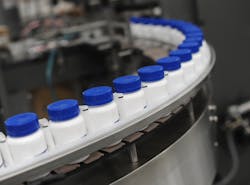Pharma News: Global pharma contract manufacturing to reach $84B in 2020
Global pharmaceutical contract manufacturing market to grow at 6.4% through 2020
A new report forecasts growth in the Global pharmaceutical contract manufacturing market from $58 billion in 2014 to $84 billion in 2020.
Driving the growth in the sector are pharmaceutical companies’ continued focus on research and development, resulting in outsourcing of manufacturing. Whereas, in-house packaging, capacity utilization issues, and increasing lead time and logistics costs will hinder growth in the sector.
The U.S. continues to hold the largest share in the sector, while India will see the greatest growth over the period.
EMA and PIC/S release draft guidance for safety in medicines
A new draft guidance, "Good Practices for Data Management and Integrity in Regulated GMP/GDP Environments," from the Pharmaceutical Inspection Co-operation Scheme (PIC/S) and the European Medicines Agency (EMA) has been released.
The 44-page document offers a succinct but informative guide to data governance systems, organizational influences on successful data integrity management and other data integrity-related topics from the PIC/s Guides for GMP and GDP.
Pharmaceutical excipients market expected to grow at 6.1% CAGR through 2021
The pharmaceutical excipients market is forecast to reach $8.1B by 2021, growing at a compound annual growth rate (CAGR) of 6.1 percent over the five-year period, according to Market Reports World.
Contributing to the sector’s growth are the emergence of new excipients for the pharmaceutical industry, generic drug market growth and nanotechnology developments. Global industry growth, especially from Indian and Chinese markets, is expected to result in growth opportunities as well.
In 2015, the largest share of the excipients market was held by the fillers and diluents segment, and this dominance is expected through 2021. Though the lubricant and glidants segment is set to witness greater growth during the period.
Shanghai Fosun to acquire majority share of Gland Pharma in $1.4B sale
China’s Shanghai Fosun Pharmaceutical Company will acquire 86 percent stake in Gland Pharma of Hyderabad, India, for approximately $1.4 billion.
The deal marks the first large foreign investment by a Chinese company in an Indian manufacturer. The acquisition is under review by the Competition Commission of India and the Foreign Investment Promotion Board.
The deal provides Shanghai Fosun expansion capabilities and access to seven manufacturing sites.
FDA revises draft guidance for dietary supplement industry
The FDA issued an updated draft guidance for improved new dietary ingredient (NDI) premarket safety notifications to the agency in order to help identify safety concerns prior to consumer contact.
Manufacturers and distributors must notify the FDA at least 75 days before marketing a dietary supplement containing an NDI unless is used in the food supply without chemical alteration to avoid adulteration labeling.
The draft guidance update clarifies points that were not explained clearly in the original "Dietary Supplements: New Dietary Ingredient Notifications and Related Issues" released in 2011.
Ethiopia suspends trade with 11 Egyptian pharmaceutical manufacturers
Ethiopia’s Ministry of Health has suspended trade with 11 unnamed pharmaceutical manufacturers in Egypt.
The 11 companies failed to meet Ethiopian health criteria in recent inspections of 13 Egyptian pharmaceutical facilities. Egyptian authorities are working to find solutions to the problems.
GlaxoSmithKline API manufacturing site issued warning letter
The FDA released a warning letter for GlaxoSmithKline’s Worthing, U.K.-based active pharmaceutical ingredient (API) manufacturing site regarding multiple incidences of penicillin in non-penicillin manufacturing areas.
The letter, which followed an eight-day inspection of the site, called the company’s preventative measures to ensure non-penicillin drugs are not contaminated with penicillin "wholly inadequate," as was the Worthing facility’s penicillin-detection method. Contamination of the location’s water system was also detected by the FDA.
FDA works to modernize pharmaceutical manufacturing, prevent drug shortages
The Food and Drug Administration (FDA) is working with manufactures in the pharmaceutical industry to reduce drug shortages and improve quality and efficiency through modernization of technology and processes.
FDA points to the recent approval of a 3D-printed pill as a reflection of its efforts to support modernization as well as the development of its Emerging Technology Team (ETT), which works with those in the industry to identify early roadblocks that could delay adoption of new technologies. Advancement of Emerging Technology Applications to Modernize the Pharmaceutical Manufacturing Base, a draft guidance for working with the ETT, is available from the FDA.
Pfizer to begin lay off 151 after vaccine phase-out
Pfizer will begin laying off 151 employees at its Pearl River, New York, facility as part of its previously announced vaccination phase-out at the facility.
In 2009, Pfizer acquired the location from Wyeth Pharmaceuticals and announced the plans to layoff workers and phase out vaccine manufacturing and development. The location will continue developing and producing cancer drugs.
